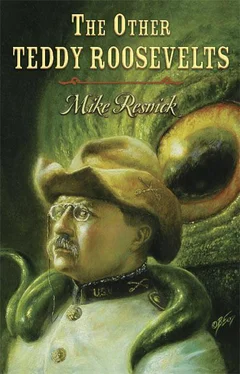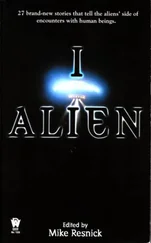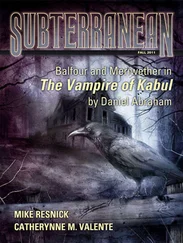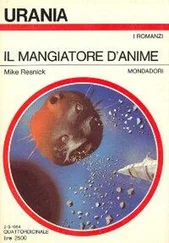“You owe me an explanation!” snapped Roosevelt. “You knew I wanted this man alive, that he had vital information!”
“He put up a fight,” said Demosthenes calmly. “I killed him in self-defense.”
“Did you tear out his throat in self-defense too?” demanded Roosevelt.
“No,” answered Demosthenes. “I tore out his throat because I wanted to.”
“Was there any doubt in your mind that I wanted him alive, that I was not paying you to kill him?”
“None whatsoever.”
Roosevelt pulled a small pistol out of his pocket. “Then I am arresting you for murder.”
“Put that toy away before I become annoyed with you, Mr. Roosevelt,” said Demosthenes, unperturbed. “I will withdraw my request for the thousand dollars, and we’ll call it even.”
“You don’t seem to understand,” said Roosevelt. “You killed a man, and now you’re going to stand trial for it.”
“If you persist in threatening me, I may have to take that gun from you and destroy it.”
“I wouldn’t advise it.”
“When I want your advice, Mr. Roosevelt,” said Demosthenes, taking a step toward him, “you may rest assured I shall ask for it.”
“That’s close enough,” said Roosevelt ominously.
“I’ll be the judge of that,” said Demosthenes.
Roosevelt fired his pistol point-blank at the tall man’s chest. He could hear the thunk! of the bullet as it struck its target, but Demosthenes paid it no attention. He advanced another step and Roosevelt shot him right between the eyes, again to no effect. Finally the tall man reached out, grabbed the pistol, and bent the barrel in half.
“Who the hell are you?” demanded Roosevelt, as he tried to comprehend what had happened.
“I am the man who is going to clean up your city for you,” answered Demosthenes calmly. “I have been doing so privately since I arrived here last year. Now I shall do so at the instigation of the Commissioner of Police. Keep your money. I will extract my own form of payment from those criminals whose presence we will no longer tolerate.”
“Don’t use the word ‘we’ as if we were partners,” said Roosevelt. “You killed a man, and you’re going to stand trial for it.”
“I think not, Mr. Roosevelt,” said Demosthenes. “I sincerely think not.”
He turned and walked out of the office. Roosevelt raced to the doorway, spotted a trio of cops at the far end of the corridor, and yelled to them. “Stop that man! Use any force necessary!”
The three men charged Demosthenes, who knocked them flying like ten-pins. Before they could gather themselves to resume the attack, he was gone.
“Who the hell was he, sir?” asked one of the cops, spitting out a bloody tooth.
“I wish I knew,” answered Roosevelt, a troubled expression on his face.
* * *
All right , thought Roosevelt, sitting at his desk, where he had been for the two hours since Demosthenes had left. He never saw my gun in the Bowery. Edith would have told me if we’d had a visitor at the apartment. The next time I saw him was right here, so he couldn’t have disabled my weapon. He knew it worked, and he knew it wouldn’t harm him.
And what about the three officers who tried to stop him? He brushed them aside like they were insects buzzing around his face. Just what kind of a man am I dealing with here?
There’s no precedent for this, and if any member of the force had seen him perform similar acts, word would certainly have reached me. Yet he implied that he’s been killing people for a year now. Probably the criminal element; those are the murders that no one bothers to report.
But what’s going on here? It’s easy to label him a madman, but he doesn’t strike me as deranged.
Roosevelt stood up and began pacing his office. Suddenly he felt almost claustrophobic. It was time to breathe some fresh air, to walk off some of his nervous energy. Maybe just getting out and exercising, taking his mind off Demosthenes for a few minutes, might let him come back to the problem with fresh insights.
Suddenly he heard half a dozen gunshots and an agonized scream. He rushed down the stairs to the main entrance in time to see four of his policemen clustered together around a fifth, who lay motionless on the pavement. A few feet away was another body, as pale as Pascale had been.
“What’s going on here?” he demanded, striding out into the open.
“I’ll be damned if I know, Mr. Roosevelt, sir,” said an officer. “Some tall guy, I mean real tall and skinny as a rail came out of nowhere and dumped that body in front of the building. We confronted him and demanded that he come inside to be interrogated, and he refused. Jacobs walked up and grabbed him by the arm, and he threw him against that lamppost. Jacobs weighed about 200 pounds, and the lamppost was twenty feet away.” The officer paused. “I think he’s dead, sir.”
“The tall man?”
“Jacobs, sir. We drew our guns and demanded that the tall man surrender to us, and he just laughed and began walking away, so we opened fire. So help me, sir, we must have hit him four or five times, and he didn’t even flinch.”
“Let’s take a look at the body he brought to us,” said Roosevelt. He walked over to the corpse. “Do you recognize him?”
“It’s Israel Zuckerman, the guy who runs the Jewish gang.” The officer frowned. “At least I think it is.”
“You’re not sure?”
“I remember Zuckerman being darker, like he’d spent most of his life in the sun. Mediterranean, I think they call the type. This guy’s so pale he looks like he’s spent the last twenty years in jail.”
“It’s Zuckerman,” said Roosevelt. “Leave that scarf around his neck until you move him inside.”
“Whatever you say, sir.”
Another officer approached them. “Jacobs is dead, sir.”
“Do you have any explanation for what happened?” asked Roosevelt.
The officer shook his head. “It almost like something out of that crazy book everyone’s reading.”
“I don’t know what you’re talking about,” said Roosevelt.
“It’s some kind of thriller about, I don’t know, this creature that kills people and drinks their blood.”
“I don’t read popular literature,” said Roosevelt with an expression of distaste.
“Well, if you change your mind, sir,” said the other officer, “it’s called Dracula .”
“I think I heard someone mention it once or twice,” said Roosevelt with no show of interest.
“It’s about this guy who can’t be hurt, at least at night. He drinks people’s blood…”
“Enough!” said a third officer, who was examining Zuckerman’s corpse. “I’d like to eat dinner again sometime before I die.”
“Sorry,” said the officer.
“All right,” said Roosevelt. “Let’s get these men inside before the sun comes up and we attract a crowd. Take them both down to the morgue, find out what killed Zuckerman (though I can hazard a pretty good guess right now), and have someone contact Officer Jacobs’ widow.”
“Shouldn’t that be your job, sir?”
“It should be, but we’ve got a killer on the loose, a killer that bullets don’t stop. I’ve got to find out what will stop him.” He paused. “I suppose we should put a guard around O’Brien, but it wouldn’t stop this man, and I’m not going to lose any more officers before I find out how to defeat him.”
He went back into the building, climbed the stairs, and retrieved his hat and his walking stick from the corner of his office. Then he went back outside. A few minutes later he was walking up Park Avenue. After a mile he turned onto 34th Street, then turned left on Lexington. He wandered the city, considering the problem, discarding one approach after another, and suddenly realized that it was daylight.
Читать дальше










